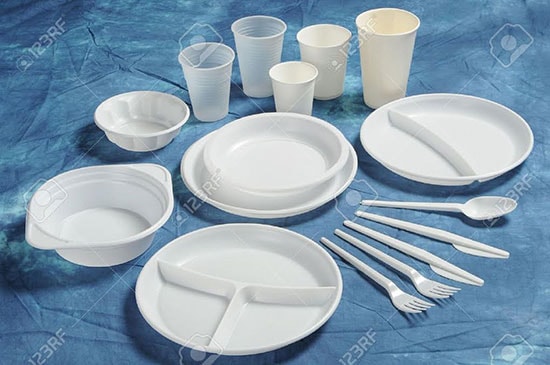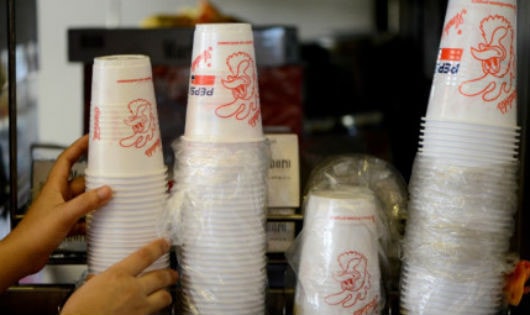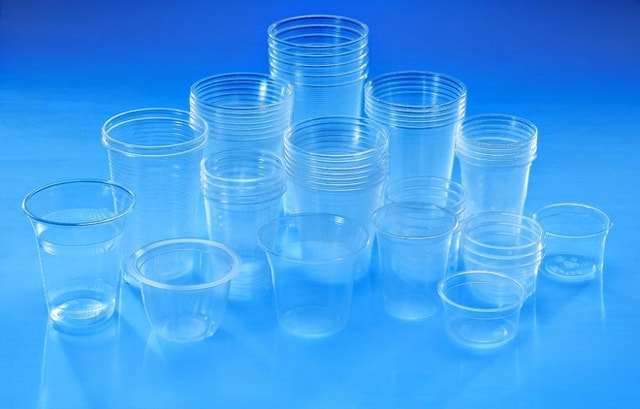Boycott wave of disposable plastic products for the environment and health
Many countries around the world have "boycotted" single-use plastic products due to concerns about environmental pollution and unpredictable dangers to human health.
The wave of boycotting single-use plastic products around the world
France recently passed a law banning all single-use plastic cups, bowls, knives, spoons, etc. This is considered the first country to ban the use of these convenient food containers.
Starting in 2020, France will end its dependence on single-use plastic items that end up in the trash.
Every year, France alone throws away 4.73 billion plastic cups and around 17 billion plastic bags from supermarkets and cafes across the country.
 |
| The law banning single-use plastics is part of France's "Energy Transition for Green Growth" plan, which is expected to come into effect in 2020. |
Previously, many countries around the world have also passed a ban on the production and use of disposable plastic cups.
Bangladesh was the first country in the world to ban plastic shopping bags in 2002 after its water pipes became clogged with plastic waste, blocking floodwaters and causing severe flooding. Since then, many other countries such as South Africa, Kenya, Mexico, Rwanda, the UK and several US states have announced similar measures. In 1993, Denmark introduced a tax on plastic bags. As a result, the average Dane now uses only about four plastic bags a year. Thanks to a similar tax in Ireland in 2002, plastic bag use has dropped by 90%.
Although not as drastic as France, 13 years ago, Taiwan pioneered strong measures to reduce the use of disposable plastics as well as a street cleaning campaign.
Accordingly, products such as bowls, bags, boxes, cups, etc. made of disposable plastic are not allowed to be bought, sold, or used in supermarkets and restaurants.
 |
| Plastic cups used to serve hot drinks have long been suspected of having negative health effects. Heat can release toxins in the plastic that disrupt hormones. |
In addition, the territory also enacted a law banning the disposal of single-use plastic items into the environment. At that time, the maximum fine for violators was 4,310 USD.
The Taiwanese government also encourages people to bring their own shopping bags and dishes when eating out.
Cancer risk from single-use plastic products
In the current context, decisive and drastic actions by France, Taiwan... are very necessary and timely because they help reduce environmental waste problems.
However, it is not only an environmental problem, we will have to immediately give up the habit of using disposable plastic products when we know how toxic they are to consumers' health.
With the features of lightness, durability, ease of use… disposable plastic products have become familiar to consumers. These products are very popular in beverage stores, fast food stores or in parties, picnics.
And this convenient, useful and seemingly harmless item actually contains many potential health risks.
 |
| Polystyrene (abbreviated and often called PS) is a fairly inexpensive plastic, white in color, lightweight, flexible, so it is often used in packaging. |
According to American and Canadian scientists, disposable plastic cups around the world are made from a type of plastic called Polystyrene, or plastic labeled number 6.
Polystyrene (abbreviated and often called PS) is a fairly inexpensive plastic, white in color, lightweight, flexible, so it is often used in packaging.
A research report by the US National Toxicology Program said that when exposed to low or high temperatures, Polystyrene can release extremely toxic Styrene.
Styrene is a carcinogen, can destroy DNA in the human body, cause birth defects, nervous system disorders (fatigue, stress, insomnia), affect blood concentration (low platelet count, causing stroke), etc.
Styrene, in particular, is very easy to penetrate the body. And even small concentrations of poisoning can have negative consequences for health.
In addition, plastic products often contain a substance called BPA that has been shown to cause cancer, affect the brain, slow development, cause hepatitis, endocrine disorders and infertility.
Symbols on plastic bottles to note:
No.1:PET plastic (polyethylene terephthalate plastic): Plastic bottles with this symbol should only be used once. If reused, if containing hot water over 70 degrees Celsius, not only will they deform but they will also decompose into substances harmful to health.
Number 2:HDPE plastic - high density polyethylene. These plastic bottles can withstand temperatures up to 110 degrees Celsius and are often used to store food, shower gel, or other highly purified items.
Although it does not emit any toxic substances, when reused, this type of plastic is difficult to clean, and the remaining substances can easily become a breeding ground for bacteria.
No.3:PVC plastic. This substance can release a lot at high temperatures so it is often found in raincoats, construction materials, plastic boxes... This type of plastic is also only allowed to be used for food and drinks with temperatures below 81 degrees Celsius.
Number 4:LDPE plastic - low density polyethylene. LDPE is quite common in noodle boxes, shopping bags, candy wrappers... This substance cannot be heated in a microwave because it will release toxic substances.
Number 5:PP plastic (polypropylene plastic). PP is often found on the lids or bottoms of coffee cups, regular milk, yogurt or juice bottles. This material is usually resistant to temperatures of 167 degrees Celsius, so it can be reused and microwaved.
Number 6:PS (polystyrene) plastic. PS is often found in drinking cups and foam food containers that are for single use only, meaning they are not reusable. When used at high temperatures, these products often produce the extremely toxic substance Styrene.
Number 7:PC plastic. PC is widely used, especially in making milk bottles and disposable cups. Products containing this type of plastic contain BPA, which is very dangerous and can decompose into carcinogenic substances.
According to Young Knowledge
| RELATED NEWS |
|---|








